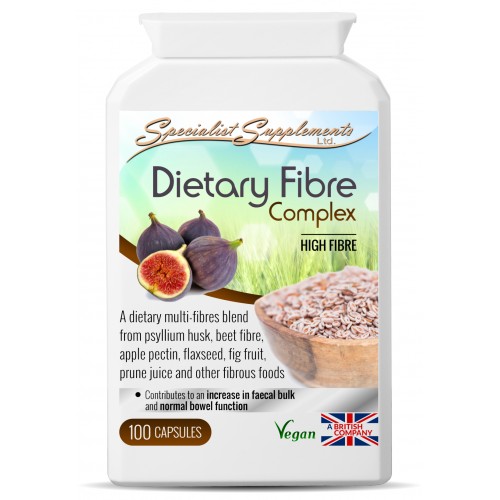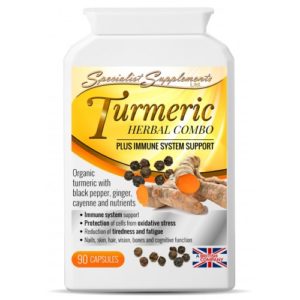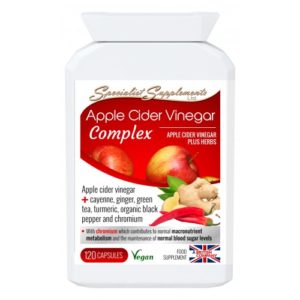Description
Dietary Fibre Complex Digestive Health
Improves Digestion, heart health and Immunity
Dietary Fibre Complex is a multi-fibres blend, providing 513mg of dietary fibre per capsule to improve digestion, immunity and heart health
The high-quality fibre is derived from psyllium husk, flaxseed, sugar beet, prune juice, fig fruit, rhubarb, pectin and other naturally high-fibre foods and herbs.
This fibre complex will provide the user with a healthy combination of both insoluble and soluble fibre (a key ingredient to a healthy, varied and balanced diet). It is more than just roughage – it also provides cellulose, pectin, hemicellulose, lignin and gums all valuable contributors to digestive health.
Ideal support for regularity, an increase in faecal bulk, normal bowel function and a low toxic load.
Benficial For
A healthy digestive system
Increasing the weight, bulk and softness of stool
Bowel regularity
Constipation
Cholesterol levels
Digestive transit
Increasing nutrient levels
Slowing the absorption of sugar into the bloodstream
Binding with toxins in the gut
Reducing inflammation
# Approved EFSA health claims:
- Fibre is a key ingredient to a healthy, varied and balanced diet.
- Sugar beet fibre contributes to an increase in faecal bulk in two ways: the insoluble components of the fibre increase faecal bulk by absorbing water in the large intestine, while the soluble components are fermented by bacteria in the large intestine leading to an increase in bacterial mass. As such, this source of fibre may have a beneficial physiological effect for people who want to improve or maintain a normal bowel function. Click here for EFSA scientific opinion.
Per capsule:
Psyllium husk powder – 495mg
Flaxseed powder – 70mg
Sugar beet fibre – 52mg
Fenugreek powder – 50mg
Apple pectin powder – 20mg
Rhubarb root extract 30:1 (equivalent to 360mg fresh rhubarb powder) – 12mg
Fennel seed powder – 10mg
Prune juice fruit extract 5:1 (equivalent to 50mg fresh prune juice) – 10mg
Broccoli extract 15:1 (0.5% sulphurophane) (equivalent to 75mg fresh broccoli powder) – 5mg
Carrot powder – 5mg
Fig fruit extract 4:1 (equivalent to 20mg fresh fig powder) – 5mg
Psyllium husk:
Psyllium is a leafy-stemmed Eurasian plantain, the husks and seeds of which are used as a laxative and bulking agent in the treatment of constipation and, in some cases, obesity. Psyllium is naturally rich in dietary fibre, providing the extra fibre that so many people need in order to maintain regular and healthy bowels. Psyllium husk is a water absorbing / retention fibre, which gives bulk to stools by absorbing water – as much as 20 times its own weight! This gives the bowel wall something to work on and lets it push matter through smoothly and quickly via peristalsis. Fibre also stimulates natural bacteria in the bowel. When water is added to psyllium husks, a soft gel is formed, which helps the unwanted matter in the colon (constipation) to move through smoothly, with no straining or discomfort, know as colon cleansing.
Flaxseed:
Flaxseed is one of the best sources of Omega 3 fatty acids, a type of “good fat” that is generally missing from the Western diet. These acids can help to lower high cholesterol and high blood pressure, reduce elevated triglyceride levels and help to prevent blood clots. They can also lower elevated blood levels of the protein homocysteine, believed to be a major risk factor for heart disease. Flaxseed is also a rich source of lignans, a type of fibre that is changed by friendly bacteria in the gut into compounds that help to fight against disease. Lignans also modulate hormone levels and relieve some of the symptoms often associated with menopause. Flaxseed contains a natural antioxidant, which is thought to help muscles recover more quickly and has an anti-inflammatory effect that can help to reduce muscle soreness.
Sugar beet fibre:
Sugar beet fibre has been included in this formula because it has been scientifically proven to contribute to an increase in faecal bulk in two ways: the insoluble components of the fibre increase faecal bulk by absorbing water in the large intestine,while the soluble components are fermented by bacteria in the large intestine leading to an increase in bacterial mass. As such, this source of fibre may have a beneficial physiological effect for people who want to improve or maintain a normal bowel function.
Fenugreek:
Fenugreek (Trigonella foenum-graecum ) is a bitter, medicinal herb that is loaded with antioxidants and has laxative and anti-parasitic effects. It also increases milk flow, stimulates the uterus, soothes irritated tissues, lowers fever, reduces blood sugar, improves digestion and promotes healing. It stimulates the immune system and aids in removal of toxins from the body through the lymph nodes. The seeds (Methi), in particular, are rich in lipids, protein, protease inhibitors, alkaloids, mucilaginous fiber, phosphorus, iron, calcium, niacin, vitamin C, selenium and various other nutrients. They have stimulant, anti-parasitic, anti-inflammatory, aphrodisiac, expectorant, laxative, hepatoprotective and diaphoretic properties. Plus, it is believed that the seeds reduce fatty tissues, thereby aiding in natural weight loss.
Apple pectin:
Apples are a rich source of pectin: a naturally-occurring carbohydrate. Pectin is particularly good at helping to lower blood cholesterol levels. The liver pumps excess cholesterol into the bile, which then enters the intestines. If pectin is present in the intestines, it will bind with the cholesterol and take it out of the body. Pectin also changes into galacturonic acid, which can combine with heavy metals (such as lead and mercury) and certain radio active materials in the gut and take them out of the body. For people who are prone to constipation, pectin can provide a gentle form of fibre, which acts as a bulk laxative and mops up toxins that enter the intestines.
Rhubarb root:
Rhubarb is widely used as part of colon cleansing programmes, because it contains the following active ingredients: anthraquinones, emodin, tannins, flavonoids (including rutin) and several polyphenols. Rhubarb is a strong herbal laxative, astringent-bitter, gastric stimulant, anti-inflammatory, stomach tonic and antiseptic. It is also used for disorders of the liver, gallbladder and stomach.
Fennel seed:
Fennel (Foeniculum vulgare) is a plant species in the genus Foeniculuma and is a highly aromatic and flavourful herb with both culinary and medicinal uses. For example, it an be used as an effective diuretic and as a potential treatment for hypertension. It contains anethole (a type of aromatic compound that occurs widely in natural essential oils), which can explain some of its health benefits. It also has carminative properties; in other words it prevents the formation of gas in the gastrointestinal tract or facilitates the expulsion of that gas, thereby combating flatulence. It can also relax the intestines and reduce bloating caused by digestive disorders.
Prune juice:
Prunes and their juice contain mild laxatives, including phenolic compounds and a number of different sugars like sucrose, fructose and sorbitol that help in drawing fluid into the intestines, thus helping the passage of waste out of the body. Research has shown that prune juice greatly helps in increasing the volume of fluid that remains in the waste passing through the intestine, while also causing contractions that aid bowel movement. Sorbitol, in particular, metabolises slowly to support healthy digestive processes. Prunes also contain high levels of antioxidants and dietary fibre (about 6% or 0.06g per gram of prune) and are therefore well-known for their contribution to the maintenance of a healthy bowel and alleviating constipation.
Broccoli:
Broccoli is a rich source of carbohydrates, including dietary fibre. It therefore acts to support the digestive system, bowel regularity and stable blood sugar levels. It contains ther essential nutrients like vitamin A, B vitamins, vitamin C, vitamin K, folate, magnesium, calcium and diindolylmethane – a potent modulator of the innate immune response system with anti-viral and anti-bacterial activity. As a cruciferous vegetable, broccoli is also high in natural organic sulphur, which is needed by the liver to carry out its detoxification processes. Sulphur-containing amino acids (such as taurine and cysteine) are necessary for the production of bile. It is important not to have sluggish bile flow, because this is a major exit route for toxins that the liver has broken down.
Carrot:
The carrot gets its characteristic and bright orange colour from ß-carotene, which is metabolised into vitamin A in humans when bile salts are present in the intestines. Carrots are also rich in dietary fibre, antioxidants, minerals, essential enzymes and vitamins, including vitamin B1, vitamin B2, vitamin B6, vitamin C, vitamin K, biotin, potassium and thiamine. Carrots also contain lignin (which helps to strengthen the immune system) and folic acid (which helps to fight against harmful free radicals).
Fig fruit:
Figs are one of the highest plant sources of calcium, fibre, copper, manganese, magnesium, potassium and vitamin K. They also have smaller amounts of many other nutrients. Figs have a laxative effect and contain many antioxidants. They are a good source of flavonoids and polyphenols, including gallic acid, chlorogenic acid, syringic acid, (+)-catechin, (-)-epicatechin and rutin. Figs contain pectin and are a good source of the indigestible food fibre lignin, which retains water and helps bulk up the stool. Figs also contain ficin, a protein-breaking enzyme similar to papain in papaya and bromelain in pineapple. Together, pectin, lignin and ficin make figs a highly efficient laxative food






Reviews
There are no reviews yet.